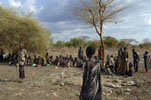
A new report from the venerable Small Arms Survey takes a close and informed look at drivers of armed violence and inter-communal conflict in southern Sudan. This report is valuable because it reviews the dynamics of proxy warfare in southern Sudan and the fragmentation of armed groups within the South during the North-South civil war (particularly during the 1990s).
The report also offered its two-cents on what should have been prioritized by the international and Sudanese community, as Sudan entered into the eleventh hour of the Comprehensive Peace Agreement. This assertion stood out to me, particularly as we continue to wait here in Sudan for official polling results to be announced:
Matters are further complicated by the current elections, which are characterized on a national level by reports of intimidation and mass disenfranchisement leading to last minute boycotts, threats, secret deals, and great confusion. Southerners have reason to celebrate being able to vote, but the rancour and divisions within the Sudan People’s Liberation Movement are growing just as it needs to pull together ahead of the upcoming referenda. If half the resources and energy—both Sudanese and international—had gone into reconciliation activities as have been devoted to ‘democratization’, Sudan’s future might seem more promising.
The report concludes by stressing the importance of “coordinated international pressure,” noting that “Sudan’s willingness to respond to such pressure led to the signing of the CPA,” and that this pressure is urgently needed once more to prevent the CPA’s collapse and renewed conflict in the South.
Photo: Murle tribe displaced by Lou Nuer attacks in the South. (AP)

